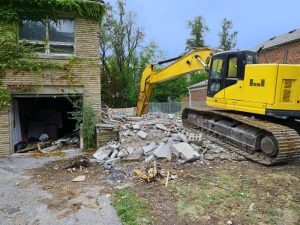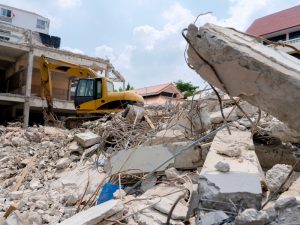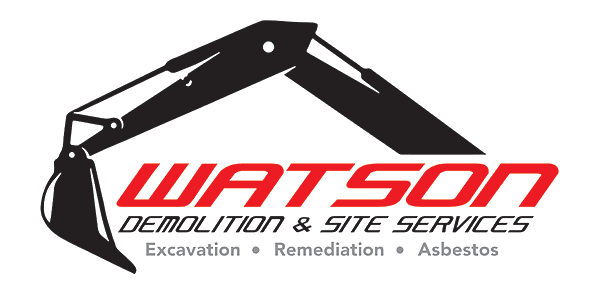Demolishing a house involves more than just knocking down walls. It’s a complex process that requires careful planning and timing. Whether you’re redeveloping a property or clearing land for a new project, choosing the right time to start demolition is crucial. This guide will walk you through the key factors that influence the timing of a house demolition project, ensuring you make an informed decision.
Why is timing crucial for demolishing a house?
Timing is everything when it comes to demolishing a house. The right timing can make the process smoother and more efficient. Here’s why it’s so important:
- Avoiding weather disruptions: Weather conditions can significantly impact the demolition process. Adverse weather, like heavy rain or high winds, can cause delays and increase risks.
- Meeting project deadlines: Proper timing helps avoid delays and keeps your project on schedule.
- Minimising disruption: Choosing the right time can help minimise disruptions to surrounding areas and neighbours.
- Optimising resource availability: Timing affects the availability of contractors and equipment, which can impact costs and scheduling.
What are the seasonal considerations for demolishing a house?
Seasonal changes play a significant role in planning a demolition project. Here’s what to consider:
- Spring and summer: These seasons are often ideal for demolition due to favourable weather conditions. The dry weather and longer daylight hours allow for extended working hours.
- Autumn: While autumn is a good time, be cautious of early frosts and unpredictable weather that could affect the demolition schedule.
- Winter: This can be challenging due to cold temperatures and potential rain. Demolition in winter can lead to delays and complications, though it may be necessary depending on project timelines and conditions.
How does local weather affect the timing of demolishing a house?
Weather conditions in your specific area can significantly influence demolition timing. Here’s how:
- Rain: Heavy rain can cause muddy conditions and make the demolition site hazardous. It may also lead to delays as workers wait for the site to dry.
- Wind: High winds can pose safety risks and make it difficult to handle equipment and materials safely.
- Temperature: Extreme temperatures, either hot or cold, can affect the efficiency of demolition work and the condition of the site.
- Flooding: In areas prone to flooding, monitoring weather forecasts and planning demolition around the likelihood of floods is essential.
What are the key safety considerations for demolishing a house?
Safety is paramount in demolition projects. Proper timing helps ensure all safety protocols are followed:
- Site assessment: A thorough site assessment before demolition can help identify potential hazards and plan safety measures accordingly.
- Hazardous materials: If the building contains hazardous materials like asbestos, it is crucial to schedule the demolition for proper removal and management.
- Worker safety: Ensuring workers are equipped and prepared for their conditions helps prevent accidents and injuries.
- Public safety: The demolition should be timed to avoid peak traffic times, and safety barriers and signs should be installed to protect workers and the public.

How do permit and regulatory requirements impact demolition timing?
Navigating demolition permits and regulations is a vital part of planning. Here’s what to keep in mind:
- Permit application: Securing the necessary permits can take time. Plan and factor this into your project timeline.
- Local regulations: Different areas have specific rules regarding demolition, including noise restrictions and working hours. Understanding these regulations helps avoid legal issues and fines.
- Inspections: Some areas require inspections before and after demolition. Schedule these inspections to ensure compliance and avoid delays.
- Compliance: Ensuring all regulatory requirements are met before demolition helps prevent complications and keeps the project on track.
What role does site preparation play in timing the demolition?
Site preparation is a critical step that impacts when you can start demolishing:
- Clearing the site: Removing obstacles like vegetation, structures, or debris from the site prepares it for demolition.
- Utility disconnections: Ensure all utilities are disconnected before demolition to avoid hazards and complications.
- Safety measures: Implementing necessary safety measures and barriers around the site helps protect workers and the surrounding area.
- Access: Ensuring that equipment and materials can easily access the site is crucial for a smooth demolition process.
How can you coordinate with neighbours and local authorities?
Effective communication with neighbours and local authorities can make the demolition process smoother:
- Notify neighbours: Inform neighbours about the demolition schedule to help them prepare for any noise or disruptions.
- Engage with local authorities: Communicate with local authorities to ensure all permits are in place and regulations are being followed.
- Provide updates: Keep both neighbours and authorities updated on the progress and any changes to the schedule.
- Address concerns: Respond promptly to any problems or questions from the community to maintain a good relationship and avoid disputes.
What are the benefits of hiring professional demolition services for timely completion?
Hiring professionals for your demolition project offers several advantages:
- Expertise: Experienced professionals bring expertise that ensures the demolition is done efficiently and safely.
- Equipment: Professionals have access to the latest equipment and technology, which speeds up the process and improves safety.
- Compliance: They handle all necessary permits and regulatory requirements, ensuring the project meets all legal standards.
- Project Management: Professional services offer project management, keeping the demolition on schedule and within budget.

How can you get a free quote or consultation for your demolition project?
If you’re considering demolishing your house, contact Watson Demolition & Site Services for a free quote or consultation. Our experienced team can provide expert advice and guidance to help you determine the best time to start your house demolition. We also specialise in asbestos removal, excavation, and other site preparation services and are committed to delivering exceptional results.

